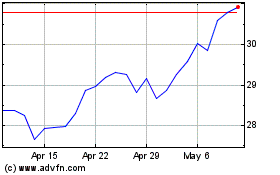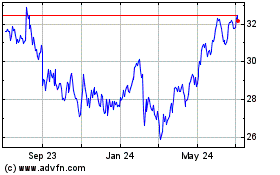By Joe Flint and Suzanne Vranica
Advertisers will get their first look this week at what the
broadcast networks have cooked up for the fall TV season during
glitzy, star-filled presentations followed by booze-soaked
parties.
The shows won't be the only new things on display. The major
networks -- ABC, Fox, CBS and NBC -- all have fresh faces calling
the shots on their programming after a year of massive change in
the entertainment industry.
At stake at the "upfronts," as the annual ritual is known:
around $10 billion in ad-spending commitments. In presentations at
New York's Radio City Music Hall, Lincoln Center and other
well-known venues, networks will try to make the case to marketers
that broadcast television, despite suffering significant viewership
declines for several years, is still the best way for brands to
reach large audiences.
Walt Disney Co.'s acquisition of most of the entertainment
assets of the former 21st Century Fox led to new chiefs at both
Disney's ABC and the Fox network, now owned by the newly formed Fox
Corp. At Disney, former Fox executive Dana Walden oversees the bulk
of the TV entertainment operations. Known as a creative executive,
Ms. Walden was involved in several hit shows over the years
including "Modern Family" and "Glee."
Fox Corp. lured Charlie Collier away from his senior role at AMC
Networks to become chief executive of entertainment for Fox. While
at AMC he was involved with "Mad Men," "Breaking Bad" and "The
Walking Dead."
At CBS Corp., Leslie Moonves, who as chief executive put his
personal stamp of approval on every show the network aired, was
forced out last year amid allegations of sexual harassment, which
he denied. Acting CEO Joe Ianniello promoted Showtime Networks head
David Nevins to chief content officer, giving him oversight over
CBS programming. Successful shows during his watch include
"Homeland" and "Billions."
Last fall, Robert Greenblatt resigned as entertainment chairman
of Comcast Corp.'s NBC and now holds a top position at AT&T
Inc.'s WarnerMedia. NBC replaced Mr. Greenblatt with veteran
executives George Cheeks and Paul Telegdy.
"It feels like there is clarity now for these four places," said
Kevin Beggs, chairman of the television group at Lions Gate
Entertainment Corp. Last year, he said, there was a lot of
uncertainty over potential changes coming to the networks and their
parent companies, and how it would impact decision-making.
The ratings picture for broadcasters doesn't look pretty.
Prime-time viewership for three of the big four networks is down,
excluding sports, as consumers flock to Netflix Inc. and other
streaming services. Ratings erosion has been exacerbated by cable
TV cord-cutting.
Despite those challenges, ad spending has been surprisingly
resilient. Spending commitments in the spring TV ad season will
grow an estimated 2.4% to $21.25 billion this year, according to
research firm eMarketer. For 2019 as a whole, networks are expected
to collect $67.23 billion from TV ads, a 1.4% decline from 2018,
according to estimates from media-buyer Zenith.
A few years ago, there were fears in the industry that TV ad
budgets would shrink faster and shift toward tech giants such as
Facebook and Google. "The digital guys have not taken a lot of TV
dollars, surprisingly so," said analyst Michael Nathanson of
MoffettNathanson.
For marketers, getting messages through to consumers continues
to get harder each year. In the fast-growing streaming-video world,
some of the biggest players like Netflix and Amazon.com Inc. show
no ads in their services. Disney's own Disney+ subscription
streaming service, slated to launch this fall, will be ad-free.
"Broadcast television is still the largest storefront window for
advertisers. It's the place that can build brands and move
products," said Fox's Mr. Collier.
Network executives argue that focusing solely on the performance
of their traditional TV shows on the day they air underestimates
their value, since viewership grows over time as people catch up
via DVRs or on-demand services.
"The networks are stuck being judged as they were in 2000 when
there wasn't this explosion of platforms," said Disney's Ms.
Walden. "The business is much more complex now and requires a
longer-range view of the performance of a show."
Jeff Bader, NBC's president of program planning and strategy,
said each episode of the comedy "The Good Place" adds nearly 7
million viewers five weeks after its first airing, through
video-on-demand, Hulu and other outlets. Over the past four years,
NBC is flat in the critical demographic of adults 18 to 49 when
delayed viewing is factored in, he said.
Selling ads to make money off all that delayed viewing is a
major focus for all media companies. "We're getting much better at
monetizing past day seven," said CBS's Mr. Nevins.
The CW Network, a joint-venture between CBS and WarnerMedia,
believes it has boosted viewership with both its online platform
and through an unusual partnership with Netflix, which streams
episodes of CW shows such as "Riverdale" soon after they air on TV.
Viewers who discovered the show on Netflix have returned to the
network for more episodes, the company says.
"We can be everywhere our viewers want to see us," said CW
President Mark Pedowitz.
Jason Kanefsky, chief investment officer at ad buyer Havas
Media, said networks are trying hard to distract from the harsh
reality of a traditional TV ecosystem that is under siege.
"The whole pitch is look over here, please don't look at the
fact that our TV ratings continue to erode," said Jason Kanefsky,
chief investment officer at Havas Media.
Write to Joe Flint at joe.flint@wsj.com and Suzanne Vranica at
suzanne.vranica@wsj.com
(END) Dow Jones Newswires
May 12, 2019 10:14 ET (14:14 GMT)
Copyright (c) 2019 Dow Jones & Company, Inc.
Fox (NASDAQ:FOX)
Historical Stock Chart
From Mar 2024 to Apr 2024

Fox (NASDAQ:FOX)
Historical Stock Chart
From Apr 2023 to Apr 2024
